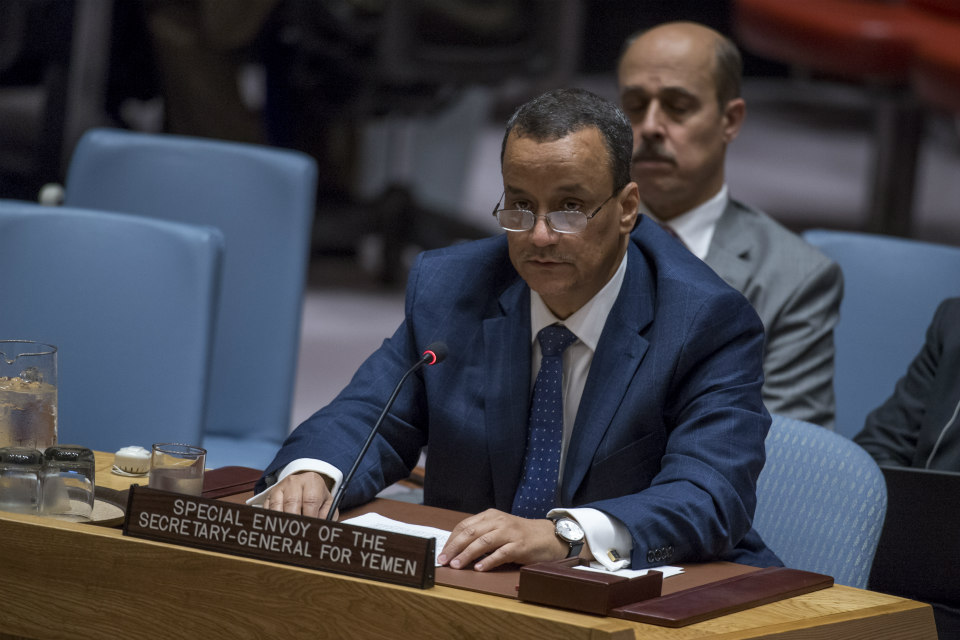Call for a Political Settlement to Address the Humanitarian Crisis and Security Threats in Yemen
Statement by Stephen Hickey, UK Acting Deputy Permanent Representative to the UN, at the Security Council Briefing on Yemen.

Thank you Mr President.
And first I’d like to thank our briefers for their updates on the situation in Yemen.
I also want to thank you warmly Ismail, for your tireless efforts over the last three years to find a peaceful solution to the conflict. We recognise that this has been an incredibly challenging task and we appreciate everything you have done to bring all the parties back to the table and to create the conditions for a sustainable peace, often at great personal risk to yourself, so I thank you on behalf of the United Kingdom.
I would also like to welcome the appointment of Martin Griffiths as the new UN Special Envoy and pledge the United Kingdom’s full support for his future efforts.
Mr President,
As we’ve just heard from the UN, the conflict in Yemen has caused the world’s most devastating humanitarian crisis. Over 22 million people – more than three quarters of the population - are now in need of humanitarian assistance. Of these 22 million people, more than half require immediate help to save or sustain life. These people will not survive unless they receive assistance.
The United Kingdom is committed to providing that assistance to the people of Yemen. We are the second largest donor to the UN’s Yemen Appeal and the third largest donor to the UN overall. We provided $286 million to the appeal in the Financial Year of 2017/18. We also continue to work hard towards finding a consensus on a Presidential Statement from this Council aimed at responding to the recent developments on the ground.
Despite the devastating humanitarian situation, last year’s Appeal was only 70 per cent funded. This year, as the situation deteriorates further, we’ve just heard that the UN are requesting a record $2.96 billion. The recent pledge made by Saudi Arabia and the United Arab Emirates to contribute $930 million to the 2018 Appeal is very welcome, as is their commitment to disburse this by the end of March. The upcoming pledging conference hosted by Sweden and Switzerland is also an opportunity to respond to the UN’s appeal and help the starving people of Yemen. We call upon all donors to answer this call and ensure all pledges are disbursed in a timely manner.
However, aid alone will not address the needs of the Yemeni people. Imports of food, fuel, and medicine continue to remain well below levels of need. All parties to the conflict must allow unhindered commercial and humanitarian access throughout Yemen, which is essential to avert the risk of mass starvation.
All plans and efforts to improve access are welcome; however, there can be no substitute for full and unhindered commercial and humanitarian access to the Red Sea ports of Hodeidah and Saleef. Eighty per cent of Yemen’s imports enter the country through these ports. Other ports lack the necessary berthing, storage, and milling capacity, and it take days to transport goods by road across multiple conflict frontlines to reach those in need.
Mr President,
The ongoing conflict in Yemen has not only given rise to the world’s largest humanitarian crisis. It’s also created ungoverned spaces that terrorists can operate in; posed security threats to regional countries and international shipping; and fuelled regional tensions. This is demonstrated by the ballistic missile launches by the Houthis against civilian targets in Saudi Arabia, and their stated intention to launch attacks against the United Arab Emirates and to “block” the Red Sea international shipping lane.
We agree with the Panel of Experts conclusion that missiles fired by the Houthis of Iranian origin and provided after the imposition of the arms embargo mean that Iran is in non-compliance with paragraph 14 of Resolution 2216. We call upon Iran to cease all and any activity which fuels the conflict in Yemen.
Until an enduring political settlement is reached, the sanctions regime is a critical tool to deter those who would otherwise use violence to achieve their political aims.
Mr President,
Humanitarian aid and access will only provide temporary relief for the people of Yemen. Ultimately, a political settlement is by far the best way to address the humanitarian crisis and security threats emanating from Yemen.
We call upon all parties to engage constructively with the incoming Special Envoy and to abandon pre-conditions in order to restart the political process. All members of this Council should employ all their influence over the parties to resolve their differences through dialogue and consultation.
Thank you.